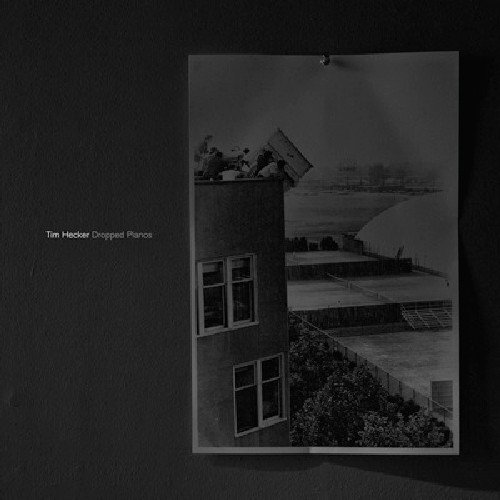
Tim Hecker
Konoyo
Release Date: Sep 28, 2018
Genre(s): Electronic, Pop/Rock
Record label: Kranky
Music Critic Score
How the Music Critic Score works
Buy Konoyo from Amazon
Album Review: Konoyo by Tim Hecker
Exceptionally Good, Based on 11 Critics
Based on rating 4.5/5
It's all too beautiful. Konoyo, in a way, looks just like its cover. Surrounding a falling electric piano and many objects and fire strewn about in a cluster, the image that one sees is much like the sound of the album it houses. It suggests at something confrontational, perhaps something lurking beneath the exterior and just waiting to burst out; and yet it hints at something oddly violent, but with an admirable restraint behind it.
Based on rating 9/10
Decades after The Replacements sang about hating music (too many notes, and such), Tim Hecker recorded 'Hatred of Music,' the two-part centerpiece of 2011's Ravedeath, 1972. Hecker was not delivering the hatred, but viewing helplessly/solemnly as the art form was tarnished and destroyed. It was music to imagine a world without it. Hecker seeks not only to preserve music, but to honor traditions while filtering them through his lens.
Based on rating 9/10
With his 2016 release, Love Streams, composer Tim Hecker processed the emanations of an Icelandic choir into diffused beams of refracted oblivion, with incredible results. Konoyo (Japanese for "the world over here") finds him collaborating with a gagaku (Japanese classical court music) ensemble in a temple located just outside of Tokyo, and resisting the urge to create dense coagulations of sound. Instead, Hecker's manipulations of the stringed, percussion and wind instrumentation are delicate and graceful; a welcome spaciousness ….
Based on rating 8.5/10
Konoyo in Japanese means "the world over here" and on his ninth studio album straddling the borders of the indescribable, Tim Hecker issues an open invitation to it. It's hard to find words for this broad-shouldered effort, which speaks well of its composition, all ornate and dulled at the same time. One can attempt to construct an academic link from Hecker's stylistic maneuvers to a time of progressive ambient minimalism belonging to the adventurous composers of the late 20th century but the Montreal composer has ascended farther into depths, through disturbance and into his own realm.
Based on rating 8.5/10
For the last decade, Tim Hecker has been on a quest to unite musician and machine, to blur the border between the sources of his sounds and the output he renders. During the two-part "Hatred of Music" suite from 2011's Ravedeath, 1972, piano sparkled through a wall of noise and ran like water into the synthesizers beneath it. Two years later, Virgins made a pointillist chamber ensemble sound like Steve Reich trapped inside an electric storm.
Based on rating 8.5/10
Hecker's work oftentimes unleashes a sense of imminent dread, even decay, but while his particular subgenre evokes themes of fear, he's contrarily equipped to offer heavenly versions. While Konoyo's musing components are part of what help fuel its seven tracks, its first, "This Life", begins rather inversely and is quintessential Hecker - a shuddersome opener that unmistakably casts feelings of apprehension with its warning-like siren howls. But while "This Life" might initially sound like a scrapped Ravedeath, 1972 demo, Hecker masterfully tinkers with its setup, converting it into a distinct track all its own, one that's not only cleansing in spirit, but strangely holy by its end.
Based on rating 4.2/5
When he began releasing music in the early 2000s, it was hard to get a read on Tim Hecker. Much like Christian Fennesz and Oren Ambarchi, he was using his guitar and electronics to conceive of new soundworlds, but in dismantling the likes of Van Halen, he made it hard to tell if he was just about cheeky recontextualization or if there were other forces at play. 16 years later, Hecker has become a force in experimental music whose work draws on drone, shoegaze, electronic music and modern classical without quite sounding like any one of them.
Based on rating 8/10
It is often assumed, falsely, that great solo artists are those who struggle to work with other people. This often provides a myth of independence that comes to overshadow the importance of external contributions to the work of such individuals. Tim Hecker, the Canadian experimental composer who has risen to become possibly the most famous contemporary 'ambient' artist, provides a case in point.
Based on rating 8/10
Tim Hecker recorded most of Konoyo in Japan, working with members of the gagaku ensemble Tokyo Gakuso, who play a variety of traditional wind and percussion instruments. Hecker's previous album, Love Streams, featured vocals by an Icelandic choir, who sang in a nonsensical language and were twisted into bizarre, alien forms. Hecker does similar business with the gagaku ensemble on Konoyo, sometimes rendering the source material nearly unrecognizable, letting it seep through the mix in subtle ways.
Opinion: Excellent
H aving created his own particular aesthetic over nearly two decades - imagine an ambient dreamscape in the rain-soaked alley between a church and a nightclub - the Canadian composer Tim Hecker continues to hone and broaden it out. On his previous album he semi-abstracted an Icelandic choir; now he looks to Japan, collaborating with Tokyo Gakuso, a group who play traditional courtly gagaku music. Hecker takes their drums, chimes, and close, borderline discordant strings - a heady, spiritual sound - and adds his own sense of disruption, suggesting real or psychological fracture.
Opinion: Very Good
'Konoyo', Tim Hecker's ninth album, is a balanced, thoughtful record that can feel at points both joyous and suffocating. The affective imagery on this album is crisp, the subtonal range is distressing, and the crescendos are perfectly measured. This is, without a doubt, the forefront of ambient music today. Hecker's ambient compositions revolve around an attempt denaturalize sound.
'Konoyo'
is available now

